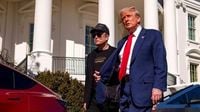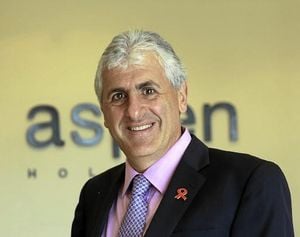In a dramatic turn of events within the Trump administration, a heated confrontation erupted between Treasury Secretary Scott Bessent and billionaire entrepreneur Elon Musk during a White House meeting last week. The altercation, which took place on April 17, 2025, was reportedly loud enough to be overheard by President Trump and other officials, highlighting the growing tensions surrounding Musk's role in government.
According to witnesses and sources briefed on the incident, the argument stemmed from a disagreement over leadership within the IRS. The New York Times reported that Bessent and Musk had been at odds regarding who should lead the agency. Musk had advocated for Gary Shapley, while Bessent favored Deputy Treasury Secretary Michael Faulkender for the position. The situation escalated when Bessent confronted Musk during a meeting, resulting in an exchange of expletives.
"It was two billionaire, middle-aged men thinking it was WWE in the hall of the West Wing," one witness described the scene. While neither man became physically confrontational, their shouting match reportedly included Bessent yelling, "F**k you," to which Musk responded, "Say it louder." The argument was so intense that an aide had to step in to separate the two, as it unfolded in the presence of Italian Prime Minister Giorgia Meloni, who was visiting Trump that day.
The clash underscores the friction that has developed between Musk and Bessent since Musk's involvement in the administration began. Musk, known for his unconventional and sometimes controversial approach, has been a polarizing figure among senior officials. One administration official remarked, "Everyone thinks DOGE is great, but Elon's antics are just a bit much." This dispute comes on the heels of Musk's ongoing role as a special government employee overseeing the Department of Government Efficiency (DOGE), which he established to streamline federal operations.
In a related development, during a Tesla earnings call on April 22, 2025, Musk announced that he would be reducing his commitment to DOGE, allocating more time to his role as CEO of Tesla. He stated, "Starting next month, my time allocation to DOGE will drop significantly," suggesting he would continue to spend a day or two per week on government matters. This announcement has raised questions about the future of DOGE and its initiatives, particularly in light of Musk's previous claims of significant cost savings for the government.
Musk's tenure at DOGE has been marked by ambitious goals, including a target of cutting the federal budget by $2 trillion. However, reports indicate that his team has only managed to achieve savings of approximately $160 billion thus far, a figure that has been disputed for its accuracy. Critics argue that the claimed savings are inflated and question the transparency of DOGE's operations. Max Stier, CEO of the Partnership for Public Service, criticized Musk's role, stating, "There’s no way that Elon Musk should have his hands around the kinds of decision-making that he does on issues that have such hard relevance to his private financial interests."
The dynamics within the Trump administration are shifting as Musk prepares to step back from his government role. Cabinet members are reportedly poised to reassert control over budgets and staffing, limiting the influence of DOGE employees. Sources indicate that without Musk's high-profile presence, agency heads will have greater autonomy in decision-making processes.
During a cabinet meeting in March 2025, tensions flared as Secretary of State Marco Rubio confronted Musk over perceived undermining of USAID, while Transportation Secretary Sean Duffy expressed concerns regarding proposed layoffs of air traffic controllers. As Musk's role diminishes, it is expected that cabinet secretaries will push forward with more targeted spending cuts, moving away from the sweeping reductions that characterized DOGE's early initiatives.
Despite the challenges faced by DOGE, Musk remains a significant figure within the Trump administration, having installed key personnel across various agencies to drive his cost-cutting agenda. His influence has been a double-edged sword, drawing both support and criticism from different factions within the government. Some observers believe that Musk's departure from a central role might actually enhance the effectiveness of DOGE, as it will reduce the attention drawn to his controversial methods.
As the Trump administration navigates these internal conflicts, the future of DOGE and its initiatives remains uncertain. Musk's assertion that the major work of establishing the department is "mostly done" suggests that while he may be stepping back, the underlying efforts to reshape federal operations will continue. The cabinet's increased control over budgetary decisions could lead to a more measured approach to government efficiency, potentially aligning with broader fiscal goals.
While Musk's future in government remains somewhat ambiguous, his impact on the Trump administration and federal policy will likely be felt for some time to come. As he balances his commitments to Tesla and his role in government, the dynamics of power within the White House will continue to evolve, reflecting the complexities of governance in an era marked by high-profile personalities and contentious debates.





